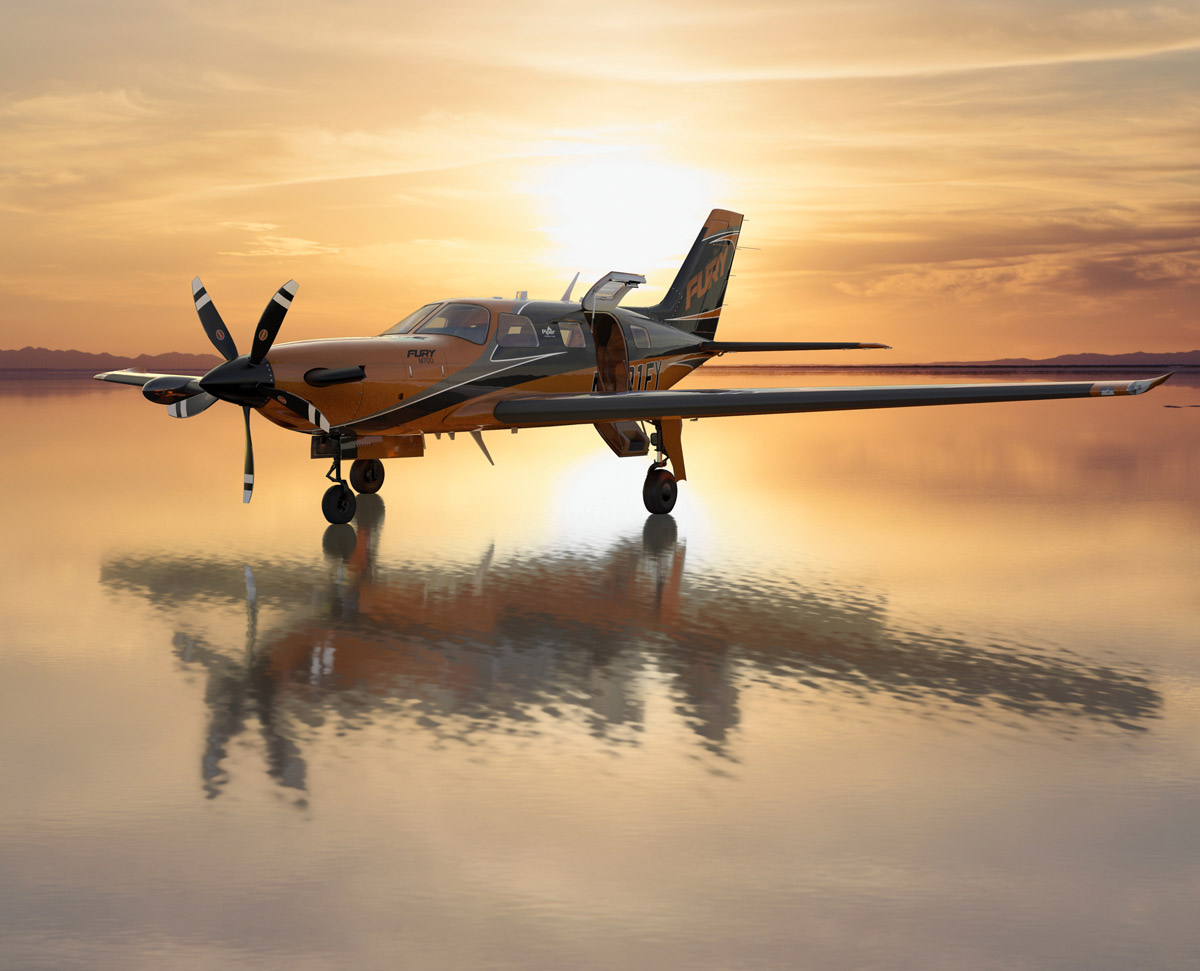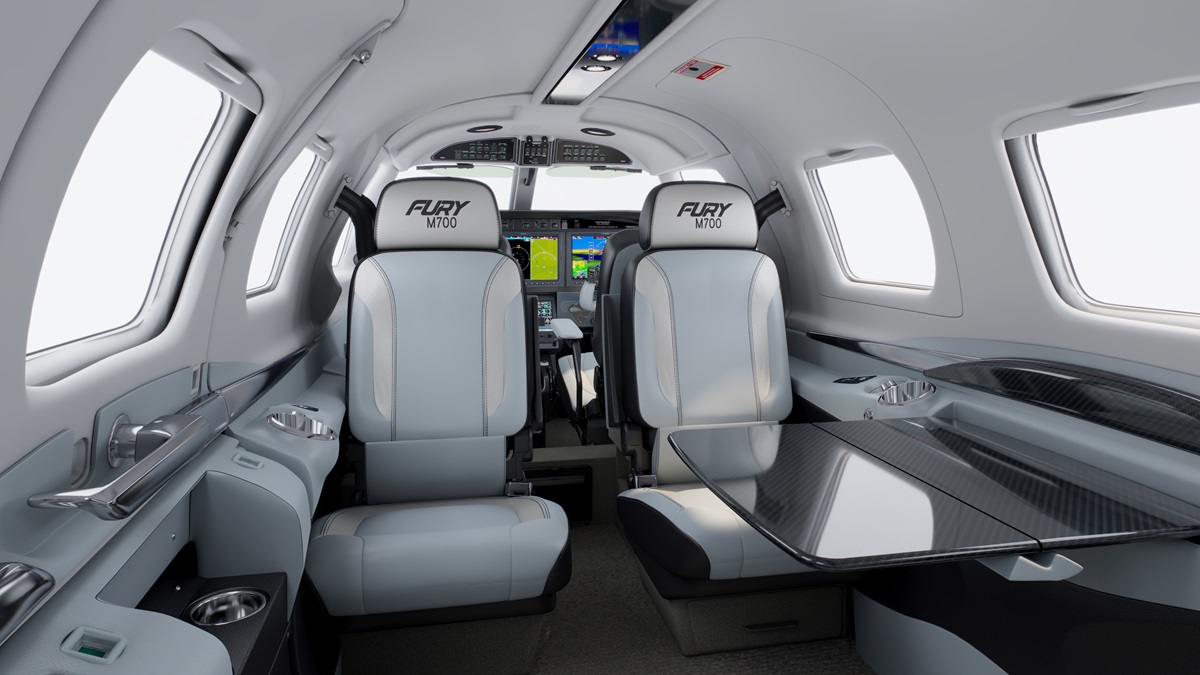Piper Aircraft, Inc. announced a new model in its PA46 line of high-performance aircraft—the Piper M700 FURY—a single-engine, 700 shaft horsepower, cabin-class turboprop.

The Piper M700 FURY represents the first step towards a new generation of the M-Class family, outperforming past PA46 models and several competitive aircraft in performance, operational cost efficiencies, and overall value. Powered by the Pratt & Whitney PT6A-52 engine, the M700 FURY boasts a maximum cruise speed of 301 ktas with a max range of 1,149 nm / 1,849 km (at max cruise speed, 1,424 nm at normal cruise speed) while maintaining its Basic Med compliant 6,000-pound MGTOW limit.
At a 301-knot max cruise speed, the M700 FURY stands alone as the fastest single-engine aircraft in Piper’s enviable 87-year, 134,000 unit production history, and it’s the second fastest model of all time. Only the mighty Piper Cheyenne 400LS turbine twin is faster.
Key performance highlights in different phases of flight include:
- Take-off Performance – TOFL distance over a 50’ obstacle at SL, STD day MGTOW is a classleading 1,994 ft., representing a 641 ft., 24 percent improvement when compared to the M600 SLS that it replaces. That TOFL performance is also 1,198 ft. (38 percent) shorter than a competing single-engine jet.
- Initial Climb – after a MGTOW departure, the M700 enjoys a class-leading 2,048 fpm climb rate, 32 percent better than the M600.
- Climb to Altitude – settled into the climb, the M700 FURY reaches a comfortable FL250 in 13.9 minutes (34 percent quicker than the M600) after covering a short 34-mile distance (35 percent less distance than prior) while only burning 97 lbs. of fuel (25 percent less fuel than the M600 and nearly 50% less fuel than a single-engine jet competitor).
- Cruise – 301-knot max cruise speed.
- Landing Performance – Landing over a 50 ft. obstacle, the M700 FURY continues its classleading performance, achieving a 26 percent reduction versus the M600 and within half the ground roll distance of some competitors.

“The M700 FURY is a beautifully efficient, cross-country thoroughbred that gives our customers a performance-based flight experience with economics never seen before,” said Piper President and CEO John Calcagno. “We listened, and we delivered. The M700 FURY encompasses power, performance and the most advanced safety measures available today and an overall value proposition that is extremely compelling to individuals and corporate flight departments alike.”
Airframe changes to accommodate the more powerful engine include a redesigned, more efficient intake plenum that improves ram air recovery, new engine mount assemblies and an improved exhaust stack design that maximizes residual thrust.
The M700 FURY features Garmin’s G3000 avionics system—a touchscreen-controlled glass flight deck. The G3000 avionics suite is the most sophisticated Garmin technology available and offers the most comprehensive, intuitive and technologically advanced package in today’s market. It all comes standard in the M700 FURY along with the HALO Safety System (including Garmin’s Autoland technology) that was first certified in the M600/SLS.
The new model will retain Garmin’s PlaneSync technology, which includes a 4G LTE Cellular and WiFi datalink that enables new avionics capabilities to streamline an aircraft owner’s pre-flight and post-flight activities. Piper is also first-to-market with Garmin’s remote aircraft status capability enabling owners to remotely check the fuel quantity, aircraft location, oil temperature, battery voltage, the current METAR at the aircraft’s location and more via the Garmin Pilot™ application. PlaneSync technology also automatically downloads databases wirelessly while the aircraft is powered down and the owner is away from the aircraft.
This new aircraft includes six (6) new interior schemes, featuring new leathers and aesthetically styled seats that have been thoughtfully crafted with the customer in mind.
FAA certification for the aircraft will be achieved before the end of Q1, 2024 with deliveries starting immediately thereafter. International validations for Canada, EASA, the UK, and Brazil will be achieved in the second half of 2024, with customer deliveries in those regions before the end of the year.

